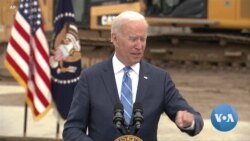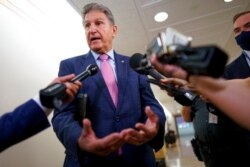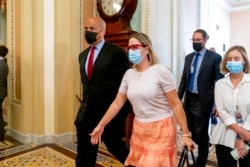President Joe Biden traveled to Michigan on Tuesday to promote his legislative priorities on infrastructure and social spending. The two bills face a stalemate in Congress as members of Biden's own Democratic Party wrangle over the size and scope of the package.
Investing in infrastructure and expanding social welfare programs are two key issues Biden campaigned on.
With his legislative agenda stalled in Congress, he visited a worker training facility Tuesday in Howell, Michigan, to promote his plans.
"It isn't enough just to invest in our physical infrastructure," Biden said. "If we're going to lead the world like we used to, if we're going to do that, we have to also invest in our people like you do right here in this training facility."
Biden pushed key legislative agendas — the $1.2 trillion infrastructure package that has bipartisan support, and the $3.5 trillion Build Back Better plan.
The latter is championed by progressives to fund what they call "human infrastructure," including education and climate change mitigation.
"They don't increase the debt because they're paid for by asking the very wealthy to begin to pay their fair share," Biden said. "As a matter of fact, a significant portion of this plan cuts taxes for working people. And best of all, the cost of these bills in terms of adding to the deficit is zero."
The plans are stuck as lawmakers in Biden's own party disagree on their size and scope.
Democratic centrist Senators Joe Manchin of West Virginia and Kyrsten Sinema of Arizona say the $3.5 trillion package is too expensive and they want it trimmed.
Meanwhile, progressives in the House of Representatives threaten to withdraw support for the $1.2 trillion infrastructure proposal unless the larger bill passes. Since the Senate is split 50-50, Democrats cannot afford to lose a single vote.
"If those two things fail, the administration is going to have not a whole lot to show for its first year," according to Jason Grumet, president of the Bipartisan Policy Center.
"And it also really calls into question the kind of core premise of the Biden presidency, which is focused, pragmatic, calm, legislative expert who can get things done. If all of a sudden the Democratic Party spins out of control under his leadership, it really calls that kind of fundamental idea into question."
Biden visited lawmakers in Congress last week but failed to get them to agree, despite popular support for some of the bills' components.
Not only would the legislation address the nation's crumbling infrastructure, but the bills would also provide for universal prekindergarten, lower-cost child care and paid family leave.
"The pandemic revealed a lot of the frailties in the U.S. economy, and the legislation is now addressing some of those," said Grumet. "There's also been a significant focus on climate change in both of these pieces of legislation, which obviously matters a lot to the global community."
Biden's Michigan visit reflects the importance of securing moderates' support by the October 31 vote deadline.
Another legislative deadline for Biden is October 18, by which date Congress must vote to increase the debt ceiling to avoid potential global economic turbulence caused by the U.S. defaulting on its debts.







